

David Dale. David Dale David Dale (6 January 1739 – 17 March 1806) was a Scottish merchant and businessman, known for establishing the influential weaving community of New Lanark, in South Lanarkshire, Scotland and is credited along with his son in law Robert Owen of being a founder of utopian socialism and a founding father of socialism Early career[edit] David Dale was born in Stewarton, Ayrshire.
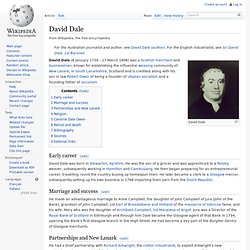
He was the son of a grocer and was apprenticed to a Paisley weaver, subsequently working in Hamilton and Cambuslang. He then began preparing for an entrepreneurial career, travelling round the country buying up homespun linen. Marriage and success[edit] He made an advantageous marriage to Anne Campbell, the daughter of John Campbell of Jura (John of the Bank), grandson of John Campbell, 1st Earl of Breadalbane and Holland of the massacre of Glencoe fame, and his wife, Mary who was the daughter of Archibald Campbell, 1st Marquess of Argyll. Partnerships and New Lanark[edit] Religion[edit] Bibliography[edit] David Dale: Biography on Undiscovered Scotland. David Dale. DALE, DAVID.
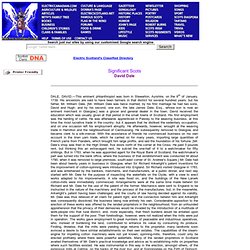
—This eminent philanthropist was born in Stewarton, Ayrshire, on the 6th of January, 1739. His ancestors are said to have been farmers in that district for several hundred years; but his father, Mr. William Dale, [Mr. David Dale. Ayrshire-born David Dale started out as an apprentice to a Paisley weaver.
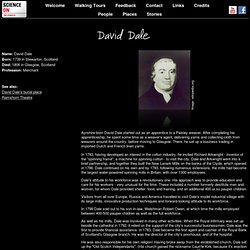
After completing his apprenticeship, he spent some time as a weaver's agent, delivering yarns and collecting cloth from weavers around the country, before moving to Glasgow. There, he set up a business trading in imported Dutch and French linen yarns. In 1783, having developed an interest in the cotton industry, he invited Richard Arkwright - inventor of the "spinning frame", a machine for spinning cotton - to visit the city. Dale and Arkwright went into a brief partnership, and together they built the New Lanark Mills on the banks of the Clyde, which opened in 1786.
Dale continued on his own and by 1793, following numerous extensions, the mills had become the largest water-powered spinning mills in Britain, with over 1300 employees. Dale's attitude to his workforce was a revolutionary one. He was also responsible for his own religion! New Lanark. David Dale - East End Glasgow History. David Dale was born in Stewarton, Ayrshire to a relatively poor family.
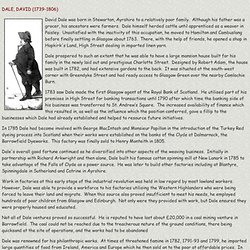
Although his father was a grocer, his ancestors were farmers. Dale himself herded cattle until apprenticed as a weaver in Paisley. Unsatisfied with the inactivity of this occupation, he moved to Hamilton and Cambuslang before finally settling in Glasgow about 1763. There, with the help of friends, he opened a shop in Hopkirk's Land, High Street dealing in imported linen yarn. Dale prospered to such an extent that he was able to have a large mansion house built for his family in the newly laid out and prestigious Charlotte Street. David Dale. David Dale, the son of a grocer, was born in Stewarton, Ayrshire, in 1739.
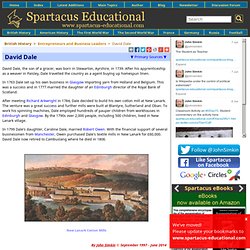
After his apprenticeship as a weaver in Paisley, Dale travelled the country as a agent buying up homespun linen. In 1763 Dale set up his own business in Glasgow importing yarn from Holland and Belgium. This was a success and in 1777 married the daughter of an Edinburgh director of the Royal Bank of Scotland. After meeting Richard Arkwright in 1784, Dale decided to build his own cotton mill at New Lanark. David Dale. David Dale was born in Stewarton in Ayrshire, the son of a poor grocer.
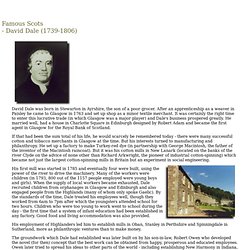
After an apprenticeship as a weaver in Paisley he came to Glasgow in 1763 and set up shop as a minor textile merchant. It was certainly the right time to enter this lucrative trade (in which Glasgow was a major player) and Dale's business prospered greatly. He married well, had a house in Charlotte Square in Edinburgh designed by Robert Adam and became the first agent in Glasgow for the Royal Bank of Scotland. If that had been the sum total of his life, he would scarcely be remembered today - there were many successful cotton and tobacco merchants in Glasgow at the time. But his interests turned to manufacturing and philanthropy. His first mill was started in 1785 and eventually four were built, using the power of the river to drive the machinery. David Dale. Robert Owen and New Lanark: 2.2 David Dale and New Lanark 1785–1800. Although New Lanark was not the first, it became one of the largest and most important cotton mills of its period.
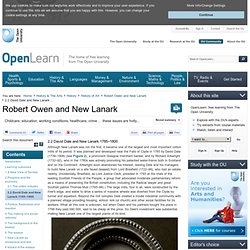
It was planned and developed near the Falls of Clyde in 1785 by David Dale (1739–1806) (see Figure 238), a prominent Glasgow merchant banker, and by Richard Arkwright (1732–92), who in the 1780s was actively promoting his patented water-frame both in Scotland and on the Continent. Arkwright soon abandoned his interest, leaving Dale and his managers to build New Lanark on a site feued (leased) from Lord Braxfield (1722–99), who had an estate nearby.
(Incidentally, Braxfield, as Lord Justice Clerk, presided in 1793 at the trials of the leading Scottish Friends of the People, a group that advocated moderate parliamentary reform as a means of preserving the British constitution, including the Radical lawyer and great Scottish patriot Thomas Muir (1765–99).) Eclectica: David Dale’s Cotton Mills. David Dale was a Scottish entrepreneur who was instrumental in establishing Scotland’s cotton milling industry.
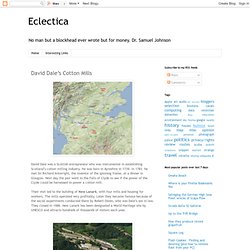
He was born in Ayreshire in 1739. In 1783 he met Sir Richard Arkwright, the inventor of the spinning frame, at a dinner in Glasgow. Next day the pair went to the Falls of Clyde to see if the power of the Clyde could be harnessed to power a cotton mill. Their visit led to the building of New Lanark, with four mills and housing for workers. The mills operated very profitably. David Dale's House. David Dale's mansion in Charlotte Street, which was demolished in 1953 to make way for an extension to Our Lady and St Francis Secondary School.
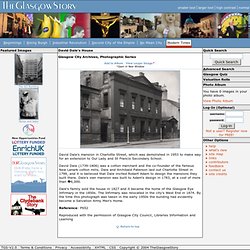
David Dale (1739-1806) was a cotton merchant and the co-founder of the famous New Lanark cotton mills. Dale and Archibald Paterson laid out Charlotte Street in 1799, and it is believed that Dale invited Robert Adam to design the mansions they built there. Dale's own mansion was built to Adam's design in 1783, at a cost of more than 6,000. Children & Cotton - Learning Zone for Social Studies & Citizenship. In the year 1784, a wealthy Scottish businessman called David Dale came to see the Falls of Clyde near the town of Lanark.
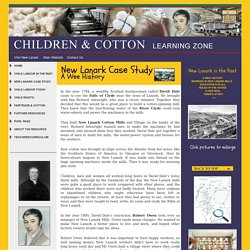
He brought with him Richard Arkwright, who was a clever inventor. Together they decided that this would be a great place to build a cotton-spinning mill. They knew that the fast-flowing water of the River Clyde could turn water-wheels and power the machinery in the mills. They built New Lanark Cotton Mills and Village on the banks of the river. Richard Arkwright trained men to make the machines he had invented, and showed them how they worked. Raw cotton was brought in ships across the Atlantic from hot areas like the Southern States of America to Glasgow or Greenock, then by horse-drawn wagons to New Lanark. David Dale - reformer. DAVID Dale proved that industry did not need to be inhuman, that factory labour could go hand in hand with dignity and enlightenment.
His mills at New Lanark in Scotland were a shining example of what could be achieved when a cotton master treated his workers as people rather than robots. Dale was born in Stewarton, Ayr, in 1739, the son of a grocer, and served an apprenticeship to a weaver. He set up his own import business in Glasgow in 1763, and four years later married the daughter of a Royal Bank of Scotland director. He became the bank's first Glasgow agent in 1783 and this led to a meeting in 1784 with Richard Arkwright, who was being given the freedom of Glasgow. The pair formed a short-lived business partnership to build cotton mills near the Falls of Clyde at New Lanark.